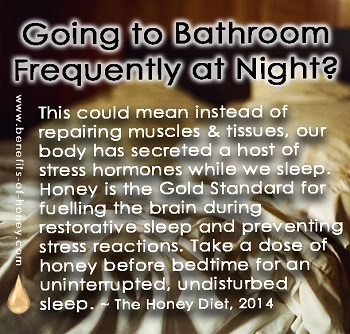
Having to Go to the Bathroom at Night too Frequently?
Many people do. In fact, some even have to wake up three or four times at night to empty their bladder. Medical doctors refer to this condition as Nocturia, a common cause of sleep loss.
A Hungry Brain is a Stressed Brain
Mike McInnes, the author of The Honey Diet believes a daily dose of honey before retiring to bed in the long run can help us sleep six to eight hours through the night.
According to The Honey Diet, honey is effective in promoting quality sleep and alleviating Nocturia, which is often associated with health conditions such as Type 1 and 2 diabetes, heart failure, bladder infection and gestational diabetes during pregnancy.

However, if our sleep is disturbed by the need to go to the bathroom at night, according to McInnes, it could also mean that instead of repairing muscles and tissues, our body has secreted a host of stress hormones while we sleep. As McInnes puts it, "a hungry brain is a stressed brain".
The strong link between sleep and metabolic disorders is supported by a growing body of research. Our brain uses a huge amount of energy when we sleep. An efficient form of brain energy comes from liver glycogen (sugar stored in our liver) as opposed to muscle glycogen (stored sugar in your muscles).

Honey Most Ideal for Stocking Liver Glycogen
The Honey Diet postulates that replenishing our liver with a tablespoon of honey at night will see our brain through the long six to eight hours nocturnal fast. Honey is believed to be the most preferred food to stock liver glycogen and ensure a steady supply of energy to the brain and prevent the brain from triggering stress reactions. It provides the small glucose spike which stimulates the release of insulin, which in turn is needed for the body to trigger the release of the sleepy hormone, melatonin.
Following a daily regimen of taking honey (raw honey is most ideal, either direct or mixed with water) before bedtime in the long run not only can help cease the need to visit the bathroom at night; it also helps us sleep better, boost our memory and concentration capacity and protect us against the damages of mental aging and cortisol related disorders and degenerative diseases such as Alzheimer's disease, dementia, and Parkinson's disease.
Feed Your Brain First
Feed Your Brain First by MD Mph Ron Fessenden goes into great detail why honey is much better than sugar and why honey can reduce your risks for the conditions and diseases associated with the metabolic stress - obesity, diabetes, heart disease, high blood pressure.

"Since ancient times, honey has been known for its many healthful benefits, but what many don�t know is that honey is the GOLD-STANDARD of carbohydrates, producing more liver glycogen for brain fuel than any other food." Feed Your Brain First, Ron Fessenden
More Related Articles
1) Easiest way to keep your liver healthy and build body immunity: Honey Diet for Hibernation
2) Link between sleep and weight loss: How to Sleep and Lose Weight at the Same Time?
3) Well-known myths and theories about dieting: Health and Nutrition: 5 Jolting Findings.
4) Scientific theory of The Honey Diet: Hibernation Diet Links Sleep and Obesity.
End of "Having to Go to the Bathroom at Night too Frequently?". Back to "The Honey Diet".